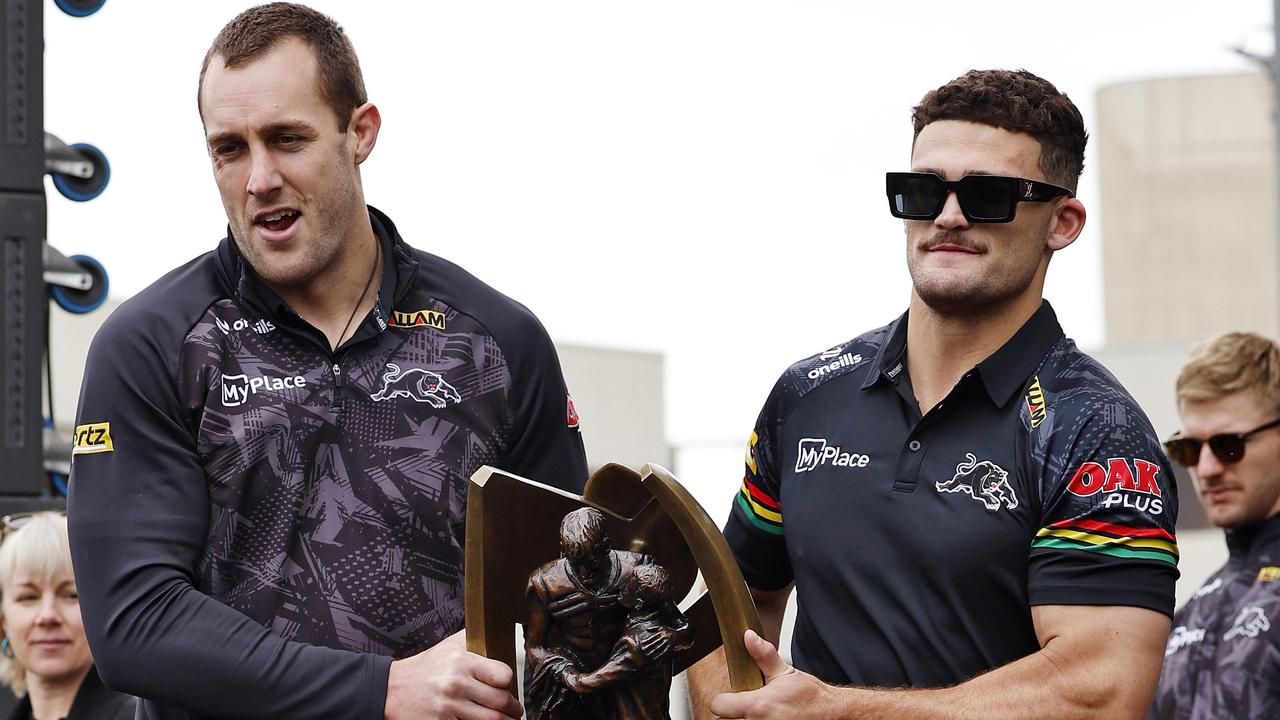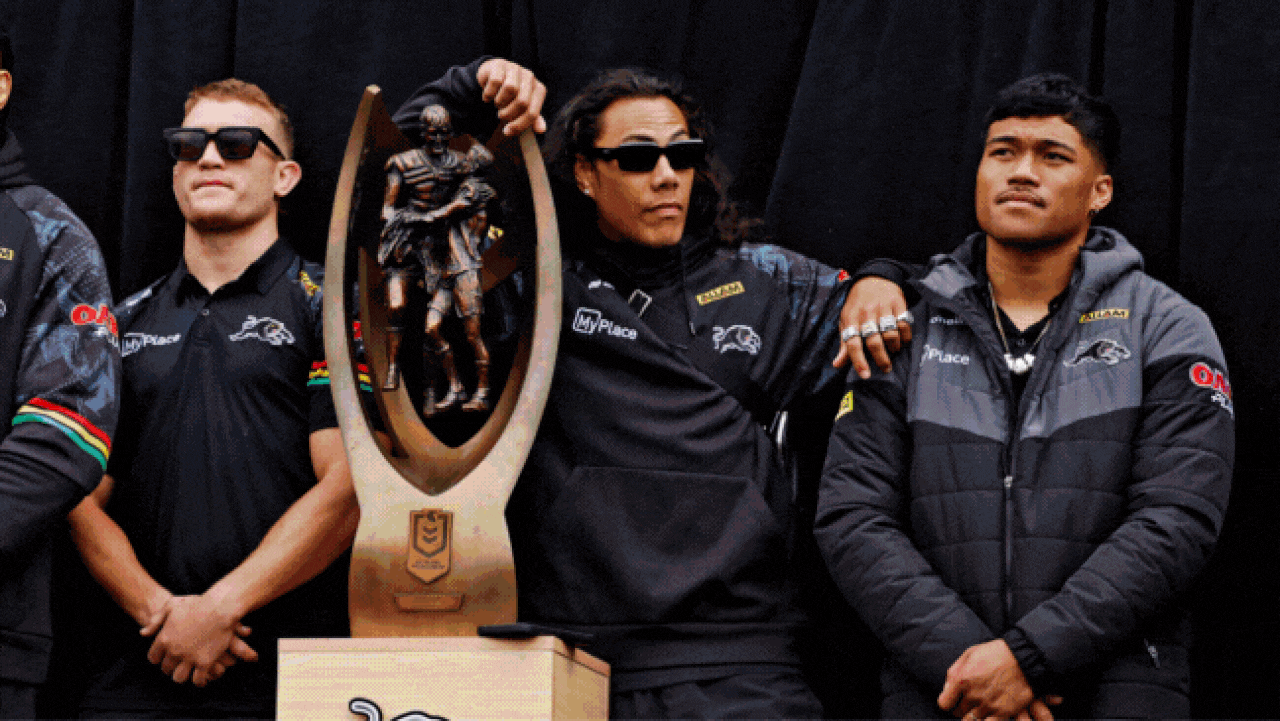Friday face-off: Benji Marshall v Jamie Soward — who’s had the better career
THEY’RE two players who polarise opinion, but which one would you build your club around? Benji Marshall v Jamie Soward — who wins the Friday face-off?

NRL
Don't miss out on the headlines from NRL. Followed categories will be added to My News.
IN the Friday Face Off, we get to the heart of the greatest contests in rugby league.
So far we’ve pitted Billy Slater against Greg Inglis, Sam Burgess v James Graham, Shaun Johnson v Daly Cherry-Evans, Jamie Lyon v Justin Hodges and last week Corey Parker v Paul Gallen.
This week we look at two talented playmakers who polarise public opinion — Dragons ace Benji Marshall and Panthers star Jamie Soward — and ask, who’s been better?
Who has had the better club career?
The turnaround in Jamie Soward’s career following Wayne Bennett’s move to the Dragons was nothing short of phenomenal. After a stellar junior career, Soward ran out of friends at the Roosters and was jettisoned to the Dragons on a mid-season transfer in 2007.
Those initial 18 months at the Dragons were solid enough, but Soward seemed a long way away from realising the potential he’d shown as a junior. While he always had the tools, Soward struggled for consistency throughout the earlier stages of his career, to the point where Nathan Brown dropped him on the eve of the Dragons 2008 semi final in favour of Ben Rogers.
But when Bennett joined the club the following season, Soward instantly became one of the top five-eighths in the league.
If not for Jarryd Hayne deciding to burn down rugby league in the latter stages of the year Soward would have won the Dally M — he recorded 27 try assists and career high 15 line breaks, 20 line break assists as well as 72 tackle busts and 12 tries. His imperious kicking game, always his greatest strength, came to the forefront and he became the beating heart of Bennett’s powerful and methodical teams from that era.
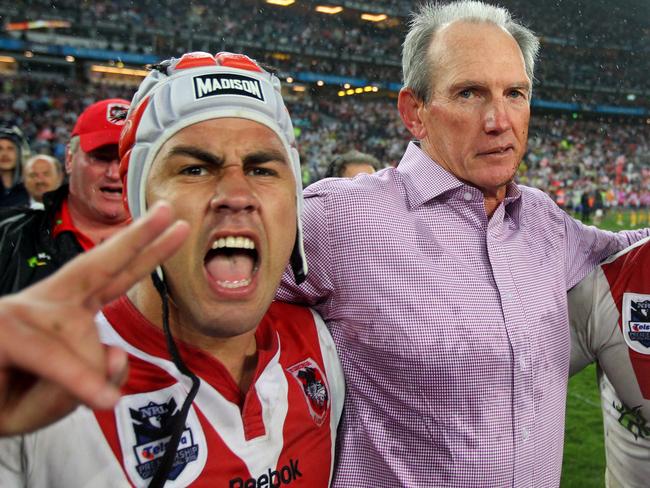
Soward flamed out of the Dragons midway through 2013, but he was their most valuable player from 2009 onwards and the club would not have won the 2010 premiership without him. He was a player who always had all the tools, but it took him some time to put them all together.
Phil Gould was mocked when he described Soward as a marquee signing for the 2014, but that’s just what he was for the Panthers. While he wasn’t as dangerous as a runner as he was with the Dragons, Soward’s distribution was as good as ever and he churned out a career high 28 try assists.
As the team was torn apart by a wretched injury toll, Soward was the sole constant as the other attacking weapons in the side fell around him. Penrith limped into the finals in fourth spot and were despised outsiders against the Roosters. Soward managed to will his team to victory, helping create Dean Whare’s late try, levelling the scores with a sideline conversion and booting the matchwinning field goal a minute before the end. There have been peaks and troughs in Soward’s club career, but since 2009 when he’s been fit and motivated he’s been the kind of player you can build a premiership around.
While Marshall started earlier than Soward, making his first grade debut at just 17, he also took a little time to get going. With the notable exception of 2005, where he was one of the chief attacking weapons in the Tigers incredible run to the premiership, from 2004 to 2008 he was hampered by a series of injuries at nearly every turn. Multiple shoulder reconstructions meant he played just 49 matches from a possible 96 in seasons 2004 and 2006-08.
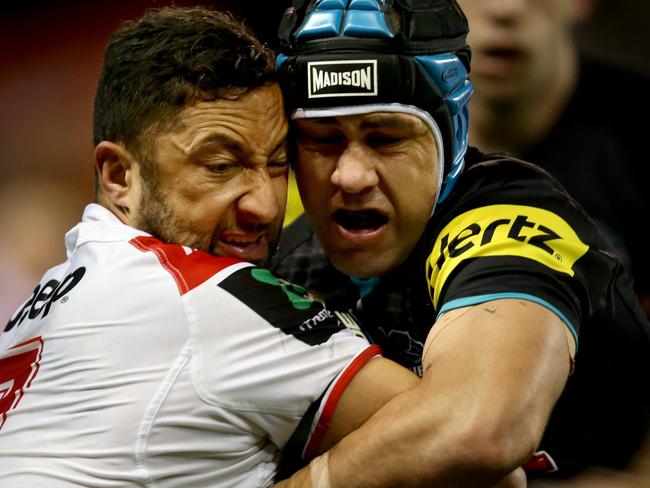
When he finally returned to full fitness in 2009, Marshall was a vastly different player to the one he’d been in 2005.
In the Tigers premiership winning season, Marshall was a runner first and foremost — his exaggerated, jumping sidestep was the hallmark of his play from the day of his debut and he was the perfect foil for Tigers skipper Scott Prince.
From 2009 onwards, Marshall was still a dangerous runner when he chose to take on the line, but he was far more focused on distribution, with flick and no look passes his weapon of choice.
Marshall led the Tigers to just two finals appearances, in 2010 and 2011, but led the league in try assists twice (in 2009 and 2011) and was one off the lead again in 2012 when he notched a career high 37 assists. The 2010 and 2011 seasons were his best — on both occasions he was the dominant playmaker in Tigers sides that had the talent to win the premiership.
Ironically, it was Soward’s Dragons in 2010 who knocked the Tigers out of the finals with a 13-12 win in the preliminary final. While a late collapse against the Warriors in 2011 cost Marshall the chance to add to his earlier title.
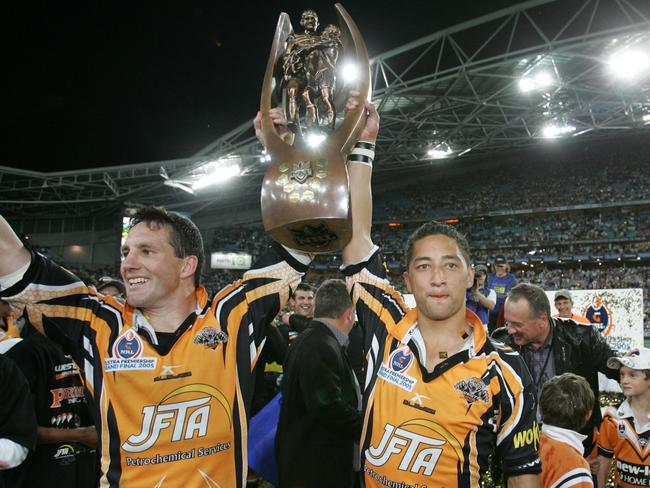
The New Zealander’s time with the club ended in tears and he departed after a subpar 2013 season for a short and unsuccessful stint in rugby. After a dusty start with the Dragons, Marshall has been one of their better performers over the last 18 months and led the team in try assists in 2015.
While the club careers of the two have been rather similar, we’re going to give Soward the nod. Marshall was an important part of the Tigers’ 2005 premiership-winning side, but he wasn’t the dominant playmaker like Soward was in 2010.
Some of this was due to circumstances beyond Marshall’s control, which we’ll explore a bit later, but being the best player on a championship team is an important feather in Soward’s headgear and enough for him to sneak this category.
Who has had the better rep career?
Soward’s rep career has been limited to a couple of appearances for Country and a sole series with New South Wales, but it was better than advertised. In 2011 Soward became the first of three halves partners for Mitchell Pearce who were dumped after a single series and he arguably could feel harder done by than James Maloney or Todd Carney.
After a solid debut in Game I of 2011, Soward was excellent in Game II and he produced the best kicking display by a Blues half in many years. He also iced the game with a scything run that created the final try for Anthony Minichiello in the Blues 18-8 victory — which broke a five game drought that stretched back to 2009. The Blues went down in the decider, but Soward had showed enough to earn a recall for the 2012 series, which was denied to him when he was dropped in favour of Todd Carney.
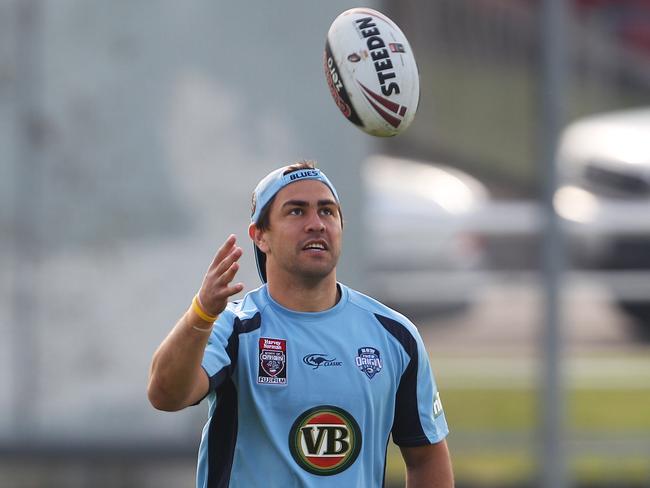
Marshall’s rep career began in 2005 when he played halfback for the Kiwis in their Anzac Test defeat to Australia, but it didn’t really get going until the 2008 World Cup. A fixture at five-eighth throughout the tournament, Marshall was a key figure in New Zealand’s shocking win in the final and he scored a try that helped give the Kiwis an unassailable lead when he picked off a wild Billy Slater pass. A strong showing in the 2009 Four Nations precluded a stellar 2010 tournament with Marshall truly putting forth a case that he was one of the best players in the world.
The Kiwis victory in the final is often overshadowed by the 2008 World Cup, but it was close to the best game of Marshall’s career. New Zealand won 16-12, with all three Kiwi tries coming from Marshall’s creativity, including the winning try for Nathan Fien inside the final two minutes of the match.
Marshall had just one more post-season tournament with the national side before he was surpassed by Shaun Johnson and Kieran Foran. But his strong performances in clutch situations and his stint as Test captain means he takes this category in a canter.
Who has the higher ceiling?
When Soward was coming through the juniors with the Roosters he seemed to have no ceiling. Some of the things he did seem more like myths than reality — for example, in 2004 he led the Roosters Jersey Flegg side to an undefeated premiership, scored an outrageous 365 points in a season (a record in all grades), and kicked the winning field goal in the grand final from near the 40 metre line.
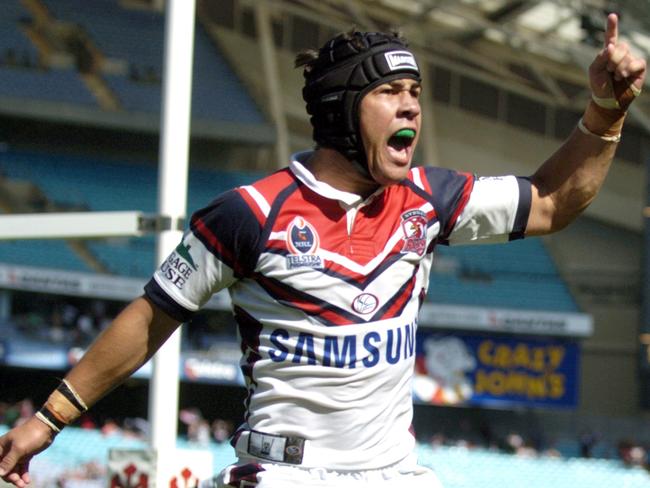
Soward has a tremendously well-rounded skillset, even if he doesn’t run as much as he did in his younger days. But it’s difficult to see a circumstance in which he plays better than he did in 2009 and 2010. That Dragons team was perfect for Soward — he had a forward pack that was among the best in the competition, a quality backline and a coach who backed him to the hilt unequivocally. Everything the team did — their ability to build and maintain pressure, their strength in the grind and their ability to close out close matches — was predicated on the basis of Soward’s skill set.
As great a career as Marshall has had, what’s somewhat unfortunate is that he was consistently forced to focus on skills and abilities that weren’t his strengths in service of his team. Sometimes, this worked a treat. When he came into first grade and even during the Tigers’ 2005 title season, Marshall’s kicking game was average at best. By this point of his career it has become yet another of his attacking weapons.
What really hamstrung Marshall was his lack of quality halves partners once Scott Prince left for the Titans at the end of 2006. Considering that the Tigers had Robbie Farah at hooker they only needed a nominal talent in the halves who could offer direction and ease the pressure on their two main playmakers, but they never really found someone who fit the bill.

John Morris was always more of a hooker, Tim Moltzen was continually moved to fullback, Jacob Miller and Blake Lazarus never really kicked on and Rob Lui was sacked. As a result, Marshall had to be both the explosive playmaker and the on-field general, which forced him to play in a role he was reasonably effective in but just not as dynamic as he was when he could focus solely on creating attacking opportunities.
What’s ironic about this aspect of Marshall’s career is that the player he’d been waiting for since 2007 finally arrived at the Tigers in 2013 when Marshall was halfway out the door. Luke Brooks would have been a perfect halves partner for Marshall as he wound down his career and the presence of someone like Marshall would have eased Brooks’ introduction to first grade.
Through sheer force of will Marshall turned himself into a controlling, organising type of player but it was never his natural game. If Prince had stayed with the Tigers or they’d found a suitable long-term replacement Marshall might have achieved even more in his career, which is a scary thought indeed. For that reason, Marshall takes this one.
Who has been more consistent?
While both players have experienced peaks and valleys in their career, Soward has a major edge when it comes to efficiency. Marshall has led the league in errors three times, including in 2015 and his 55 errors in 2010 and 2011 were the most of any player in the last 10 years. Whenever a player handles the ball as much as Marshall or Soward, there’s going to be a lot of errors but Marshall can be very loose with his play, which is both a weakness and a strength. It may cause him to make mistakes, but its also part of the unique attacking threat he posed in his prime.
Comparatively, while Soward might never have been as offensively spectacular, he’s also a lot less likely to make mistakes. Marshall’s 35 try assists in 2012 was the most of either player, but Soward’s career high error count is just 29 while Marshall has passed 40 errors in a season five times.
Soward is the more consistent player because Soward’s style is more conducive to consistency. As the steadier and more efficient player, he takes out this category.
Final verdict
Marshall and Soward would have been a near perfect halves combination in that each compliments the other’s strengths. Soward is best used as a methodical organiser who does the majority of the kicking and provides direction across the park. He can be a dynamic playmaker when he needs to be, but his greatest strength is elsewhere.
Marshall is best used as a spark plug, as a player who is encouraged to take on the defence and trust his instincts entirely. He can be an on-field general, but his greatest strength is elsewhere.
However, if you were building a team from the ground up you’d take Soward because he’s more consistent and is easier to build around.
While Marshall was an exquisite attacking player, Soward is slightly more well-rounded and would give you the better chance to contend on a consistent basis.
Originally published as Friday face-off: Benji Marshall v Jamie Soward — who’s had the better career




